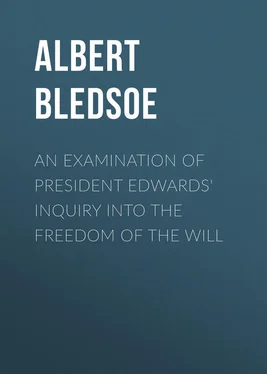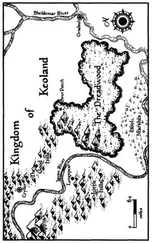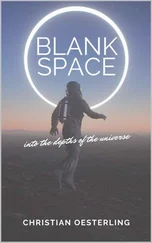Albert Bledsoe - An Examination of President Edwards' Inquiry into the Freedom of the Will
Здесь есть возможность читать онлайн «Albert Bledsoe - An Examination of President Edwards' Inquiry into the Freedom of the Will» — ознакомительный отрывок электронной книги совершенно бесплатно, а после прочтения отрывка купить полную версию. В некоторых случаях можно слушать аудио, скачать через торрент в формате fb2 и присутствует краткое содержание. ISBN: , Издательство: Иностранный паблик, Жанр: foreign_antique, foreign_prose, на английском языке. Описание произведения, (предисловие) а так же отзывы посетителей доступны на портале библиотеки ЛибКат.
- Название:An Examination of President Edwards' Inquiry into the Freedom of the Will
- Автор:
- Издательство:Иностранный паблик
- Жанр:
- Год:неизвестен
- ISBN:http://www.gutenberg.org/ebooks/35839
- Рейтинг книги:4 / 5. Голосов: 1
-
Избранное:Добавить в избранное
- Отзывы:
-
Ваша оценка:
- 80
- 1
- 2
- 3
- 4
- 5
An Examination of President Edwards' Inquiry into the Freedom of the Will: краткое содержание, описание и аннотация
Предлагаем к чтению аннотацию, описание, краткое содержание или предисловие (зависит от того, что написал сам автор книги «An Examination of President Edwards' Inquiry into the Freedom of the Will»). Если вы не нашли необходимую информацию о книге — напишите в комментариях, мы постараемся отыскать её.
An Examination of President Edwards' Inquiry into the Freedom of the Will — читать онлайн ознакомительный отрывок
Ниже представлен текст книги, разбитый по страницам. Система сохранения места последней прочитанной страницы, позволяет с удобством читать онлайн бесплатно книгу «An Examination of President Edwards' Inquiry into the Freedom of the Will», без необходимости каждый раз заново искать на чём Вы остановились. Поставьте закладку, и сможете в любой момент перейти на страницу, на которой закончили чтение.
Интервал:
Закладка:
What then, is the precise doctrine of the Inquiry which I intend to oppose? The great question is, says Edwards, what determines the will. It is taken for granted, on all sides, that the will is determined; and the only point is, or rather has been, as to what determines it. It is determined by the strongest motive, says one; it is not determined by the strongest motive, says another. But although the issue is thus made up in general terms, it is very far from being settled with any tolerable degree of clearness and precision; ample room is still left for all that loose and declamatory kind of warfare in which so many controversialists delight to indulge.
The question still remains to be settled, what is meant by determining the will? In regard to this point, the necessitarian does not seem to have a very clear and definite idea. “The object of our Inquiry,” says President Day, “is not to learn whether the mind acts at all. This no one can doubt. Nor is it to determine why we will at all . The very nature of the faculty of the will implies that we put forth volitions. But the real point of inquiry is, why we will one way rather than another; why we choose one thing rather than its opposite ,” p. 42. One would suppose from this statement, that we have nothing to do with the question, why we put forth volitions , but exclusively with the question, why we will one way rather than another . Here the author’s meaning seems to be plain, and we may imagine that we know exactly where to find him; but, in the very next sentence, he declares that the object of our inquiry is, “what is it that determines not only that there shall be volitions , but what they shall be?” p. 42. In one breath we are told, that we have nothing to do with the question, why our volitions are put forth or come into existence; these are admitted to be implied in the “very nature of the faculty of the will;” but, in the very next, we are informed that we have to inquire into this point also. One moment, only one of these points is in dispute, and the next, both are put in controversy. Surely, this does not indicate any very clear and definite idea, on the part of President Day, as to the point at issue.
The notion of President Edwards, on this subject, appears to be equally unsteady and vacillating. “Thus,” says he, “by determining the will, if the phrase be used with any meaning, must be intended , causing that the act of the will should be thus, and not otherwise: and the will is said to be determined, when, in consequence of some action, or influence, its choice is directed to, and fixed upon a particular object. As when we speak of the determination of motion, we mean causing the motion of the body to be in such a direction, rather than another,” p. 18.
Now, are we to understand from this, that the determination of the will can only refer to the question, why it is directed to and fixed upon a particular object, and not to the question, how it comes to put forth a volition at all? One would certainly suppose so; and that, according to Edwards, we have nothing to do with the question, “How a spirit comes to act,” but with the question, “why its action has such and such a particular direction and determination.” But this supposition would be very far from the truth. For he informs us, that “the question is not so much, How a spirit endowed with activity comes to act, as why it exerts such an act, and not another; or why it acts with such a particular determination?” This clearly implies, that although the question, “How a spirit comes to act,” is not chiefly concerned in the present controversy; yet it is partly concerned in it. This question is concerned in it, though not so much as the other question, why the act of the mind is as it is, rather than otherwise.
This is not all. When Edwards attacks the doctrine of his adversaries, in regard to the determining of the will, he never seems to dream of the idea, which, according to himself, if the phrase mean any thing, must be attached to it. He treats it as a settled point, that by determining the will must be intended, not causing volition to be one way rather than another, but causing it to come into existence. He could take this expression to mean the one thing or the other, just as it suited his purpose.
Are these two questions really distinct? Can there be one cause of volition, and another cause of its particular direction? I answer, there cannot. No such distinction can be shown to exist by a reference to the cause of motion. Force is the cause of motion. One force may put a body in motion; and, afterwards, another force may change the direction of its motion. Upon a superficial observation, this may seem to illustrate the distinction in question; but, upon more mature reflection, it will not appear to do so. For the force which sets a body in motion necessarily causes it to move in one particular direction, and not another; because it is impossible for a body to move without moving in a particular direction. After one force has put a body in motion, another force, it is true, may change its direction; but in such a case, it is not correct to say, that one force caused its motion and another the direction of that motion. For, in reality, both the motion of the body and its direction, result from the joint action of the two forces; or, in other words, each force contributes to the motion, and each to its direction. Both the motion and its direction are caused by what is technically called, in mechanical philosophy, the “resultant” of the two forces; and the case is really not different, so far as the distinction in question is concerned, from the case of motion produced by the action of a single force. The absurdity of this distinction consists, in supposing that a body may be put in motion without moving in a particular direction; and that something else beside the cause of its motion, is necessary to account for the direction of that motion. The illustration, therefore, drawn from the phenomena of motion, fails to answer the purpose for which President Edwards has produced it.
The same absurdity is involved in the supposition, that one thing may cause volition to exist, and another may cause it to be directed to and fixed upon a particular object. No man can conceive of a choice as existing, which has not some particular object. It is of the very nature and essence of a choice to have some particular direction and determination. If a choice exists at all, it must be a choice of some particular thing. Hence, whatever causes a volition to exist, must cause it to have a particular direction and determination. Let any one show a choice, which is not the preference of one thing rather than another, and then we may admit that there is some reason for the distinction in question; but until then, we must be permitted to regard it as having no foundation in the nature of things. If it were necessary, this matter might be fully and unanswerably illustrated; but a bare statement of it is sufficient to render it perfectly clear.
We shall hereafter see, that the reason why President Edwards supposed that there is some foundation for such a distinction is, that he did not sufficiently distinguish between the cause of a thing and its condition. Although we may suppose that the “activity of the soul” is the cause of its acting; yet motive may be the indispensable condition of its acting; and, in this sense, may be the reason why a volition is one way rather than another. But it is denied that there can be two causes in the case; one to produce volition, and another to determine its object. We have seen that such a supposition is absurd; and we shall hereafter see, that Edwards was led to make it, by confounding the condition with the cause of volition.
Читать дальшеИнтервал:
Закладка:
Похожие книги на «An Examination of President Edwards' Inquiry into the Freedom of the Will»
Представляем Вашему вниманию похожие книги на «An Examination of President Edwards' Inquiry into the Freedom of the Will» списком для выбора. Мы отобрали схожую по названию и смыслу литературу в надежде предоставить читателям больше вариантов отыскать новые, интересные, ещё непрочитанные произведения.
Обсуждение, отзывы о книге «An Examination of President Edwards' Inquiry into the Freedom of the Will» и просто собственные мнения читателей. Оставьте ваши комментарии, напишите, что Вы думаете о произведении, его смысле или главных героях. Укажите что конкретно понравилось, а что нет, и почему Вы так считаете.












